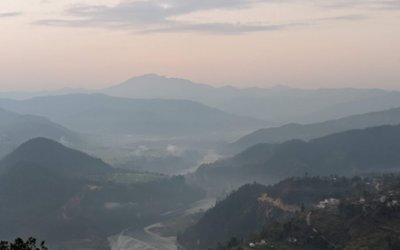The past year has been very challenging for Nepal. The two earthquakes had a tragic human cost with thousands of lives lost, homes destroyed and enormous damage to the country’s infrastructure.
This destruction, coupled with the five-month border obstructions, has also taken its toll on Nepal’s economy, which has slowed down dramatically over the last 12 months. The Nepali people had to bear the brunt of the ensuing economic slowdown and inflation due to higher prices of basic items such as fuel and cooking gas.
The European Union (EU) reaffirms its solidarity with the people and the Government of Nepal, welcomes the new Constitution as a major milestone, and assures its strong and continued support. Last year, the EU reacted quickly after the earthquakes to address the basic needs of the victims, dispatching humanitarian experts, mobilising €19.5 million for shelter, livelihoods, and health, and working closely with EU Member States and other partners to bring relief goods to the region. The EU also made available €7 million for transitional learning spaces and remote access operations in the most affected districts and recently signed with the Government a €105 million budget support for long term, resilient reconstruction efforts.
This past year highlighted Nepal's extraordinary resilience and strength in the face of adversity. It also served as a stark reminder of the country's dependency on fossil fuels. As all Nepalis know too well, Nepal has no reserves of gas, coal or oil and the country remains dependent on India for its imported fuel.
The EU believes that one way to address this dependency is for the Government of Nepal to stimulate investments in renewable energy. This will require a conducive and reliable investment climate and a rethink on whether the current vertical integration of power generation and transmission serves Nepal's interests best. These are major tasks, but with the right arrangements in place the benefits for Nepal's development will be tremendous.
Moreover, we believe Nepal’s development can gain much from tapping into its renewable energy potential by combining different renewable energy sources such as wind, solar, hydro-electric options and biomass. Progress has been made in piloting new approaches to Nepal’s renewable energy sector, and the EU remains committed in its support. For example, the Renewable Energy Project (REP), implemented by the Government of Nepal with €15 million EU funding, has benefitted Nepalese people in remote villages of 21 Himalayan districts. Focusing on solar energy, the project has provided 933 solar Photovoltaic (PV) systems and 38 solar thermal systems – generating renewable electricity for public institutions, including 378 schools, 206 health posts, and hundreds of rural communities.
Meanwhile, the €390 million Tanahu Hydropower Project, co-funded by the European Investment Bank (EIB) (€55 million), ADB and JICA, is helping Nepal develop a 140 megawatt Hydro Electric Dam on the Seti River in Tanahu district. The project is expected to start in 2022 with an average annual energy generation of 587.7 GWh – the energy content of around 350,000 barrels of oil.
Together with the EU and KfW, the EIB is working on the 37 km-long Trishuli-Chilimie Transmission Line project (€65 million). This project will connect two dozen hydropower projects, including in Upper Sanjen, Lower Sanjen and Rasuwagadhi, which will also provide much needed electrification to local villages. This important work will be complemented by the construction of the SamundratarTrishuli 3B Hub Transmission Line and Substation, a €270 million project to which the EIB will contribute €95 million.
Nepal has a huge untapped potential for further hydro-electric development and the possibility of considerably expanding its other renewable energy resources. This includes further solar energy projects in remote and isolated areas.
The Government of Nepal is already working on policies for the promotion of cleaner energies and increasing access to renewable energy – including the rural energy policy and the draft approach paper of the National Planning Commission. The implementation of these policies is an important step in supporting the development of the renewable energy sector so that it can begin to effectively contribute to Nepal’s energy demands. Moreover, the move towards cleaner energy will also reduce pollution – a severe problem in Kathmandu, which was ranked the world’s third most polluted city in the 2016 Pollution Index.
Transitioning to a more sustainable future remains a top priority for Europe – and the EU continues to develop strategies to reduce its imports of fossil fuels and develop clean and affordable energy sources. Our experience has shown us the importance of ‘decoupling’ or breaking the link between economic growth and increased emissions. For example, between 1990 and 2012 the EU managed to reduce greenhouse gas emissions by 19% whilst its economy grew by 45%. The EU has also benefitted from ambitious emissions reduction targets through legally binding legislation. Our Euro 2020 strategy for sustainable and inclusive growth has specific targets to cut greenhouse gas emissions by 20% (below the 1990 level), to ensure 20% of energy comes from renewables, and to improve energy efficiency by 20%. This was further strengthened by the 2030 climate and energy framework, which introduced a binding target to increase the share of renewable energy to at least 27% of total consumption by 2030. In the long run, the EU aims to reduce emissions by 80% by 2050, through emissions trading, improving energy efficiency, and by heavy investment in research to develop competitive renewable technologies.
Perhaps parts of our experience can be illustrative and foster a greener, more prosperous and more sustainable future for Nepal.
Rensje Teerink is an Ambassador of Head of the EU Delegation to Nepal. Source EU Delegation Nepal Website
- Development and Migration
- Dec 26, 2014
- Migration and Development
- Dec 19, 2014
- EU film festival 2014: Celebrating Women
- Mar 08, 2014
















